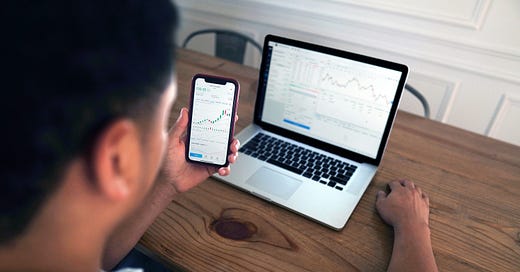I first downloaded Robinhood back when I was in college and I told one of my friends that I wanted to get into investing. I’m not sure what inspired me to do that because back then I barely had any money and I barely knew anything about business. I’m pretty sure I was intending to YOLO all my money on Tesla stock as soon as I had some (I didn’t do this, but it would have been a good decision).
Anyway, my friend told me that he knew about an app that was founded by two college kids that were sick of brokerage companies screwing everyone with commission fees. He said if I signed up with his referral link, we’d both get a free stock. So, I decided to check it out.
If you ever watched Silicon Valley, you know that every startup in the world, no matter how stupid their business model, somehow finds a way to talk about how they’re “changing the world”. But I can say that the decision to download Robinhood actually did change my life. I probably wouldn’t have as much money saved up as I do now, I probably wouldn’t have started reading so much about business and tech, and I probably would never have started writing this newsletter.
I’m bringing this up because recently, Robinhood has faced a lot of controversies. Just this week, the company got hit with a fine from the SEC and a lawsuit from the Massachusetts Security Exchange Division. So today, we’re going to talk about this legal action - and ask whether Robinhood has been a good thing for the world in general.
How Robinhood changed the game
Robinhood was founded by two former Stanford students back in 2013. The app’s goal was to “provide everyone with access to the stock market, not just the wealthy”.
From the beginning, Robinhood did things differently than other apps that allowed you to buy or sell stocks. While most brokerage companies targeted their advertising towards Boomers who were more likely to already own stock, Robinhood targeted millennials who probably didn’t know anything about trading beyond what they saw on Wolf of Wall Street. While apps like E-Trade charged users every time they bought or sold a stock, Robinhood had zero commissions.
Robinhood’s strategy paid off, and the app started growing quickly. By 2016, Robinhood had a million users. By 2019, pretty much every brokerage company out there was forced to eliminate commissions to compete. The app’s growth accelerated even faster after COVID hit and dudes who couldn’t bet on sports anymore decided to try betting on the stock market instead. In the early part of 2020, Robinhood added 3 million new users in just 4 months.
Robinhood has made investing easier than ever before. Back in the 1980s, you’d have to physically go into a brokerage company if you wanted to make a trade. Now, anybody can get started just by downloading an app on their phone. But making trades this easy does come with negative consequences - and being a big company means that you’re going to get some attention from government regulators.
How Robinhood got in trouble with the SEC
This week, the SEC fined Robinhood $65 million for misleading users about how it made money. For a while, Robinhood used to tell users it made money mostly from premium accounts. But it’s been estimated that 80% of the money that the app makes comes from “payment to order flow”.
If you have no idea what that means, it works like this: Robinhood takes the user’s stock order and gives it to a trading firm. The trading firm then makes the trade, buying the stock at a slightly lower price than what users pay. Robinhood then gets a cut of the profit the trading firm makes. While users might just lose a few pennies per trade, this makes a big difference over time. The SEC estimates that this practice cost Robinhood users around $34 million.
Robinhood was supposed to change the game because it was the first app that offered zero commissions for trades. But “payment to order flow” is basically the same thing as commissions, except users didn't know about it.
For a long time, Robinhood didn’t tell users they were doing this. For years, nothing about “payment to order flow” could be found on Robinhood’s website. It was like your little brother telling you he bought a new skateboard with money from your parents when he was actually stealing from your wallet when you weren’t looking.
Why Robinhood is getting sued by Massachusetts
In addition to getting fined by the SEC, Robinhood also got sued this week by the Massachusetts Security Exchange Division. Their suit makes a few different accusations against Robinhood. It says the app uses young actors in its commercials to attract inexperienced investors. It talks about how Robinhood showing confetti on the screen after every trade is completed makes investing seem like a game.
The suit did point out some real problems with the app, like how investors with zero experience often get approved for options trades.
This isn’t the first time Robinhood has gotten in trouble for this. A few months ago, a 20-year college student named Alex Kearns started using Robinhood because he was interested in trading. After a series of risky options trades, the app told him he had -$730,000 on his account. Alex was confused as to how the app even let him lose that much money. Horrified that he was going to be in massive debt forever, he took his own life.
The most fucked up part of this was that Alex wasn’t even in debt for that much money. It was just an error on the app’s interface.
The death of Alex Kearns is a horrific tragedy, and it’s a horrific failure by the team at Robinhood. To be fair, the company did all the right things after it happened. They reached out to Alex’s family, made changes to the app’s interface so that kind of confusion wouldn’t happen again, and upped the requirements for getting started with options trading. But obviously, this never should’ve happened in the first place.
I can’t defend Robinhood for the lies and mistakes like these. But I do think that some of the complaints in the Massachusetts suit are just Boomers not understanding the app.
Defending Robinhood from the Boomers
For years, the stock market has been the territory of the old and the rich. That’s part of the reason why you’ll hear Bernie Sanders talking about how stocks going up doesn’t really matter, because the stock market isn’t the economy. It’s been estimated that 84% of stocks are owned by the wealthiest 10% of Americans. Robinhood is starting to change that.
I’m sure many of us have friends who want to invest, but just have no idea where to start. It totally makes sense: buying stocks is intimidating at first. You have no idea what makes a stock go up or down, or what an index fund is and why that might be better than buying an individual stock, or what a P/E ratio is. Traditional brokerage apps didn’t really have a good solution to this problem. E-Trade’s interface looks incredibly boring and intimidating to anyone who’s never invested.
On the other hand, Robinhood is simple. I can show the app to a friend who’s never used it before, and they can understand it right away. That makes it more likely that new users can get started on the app and start building wealth over time.
The fact that Robinhood is so easy to use means that people who typically wouldn’t invest are coming into the market. For years, fewer African-Americans and Hispanics owned stocks than their white counterparts. But apps like Robinhood have cut that gap in half in the past four years.
So before we throw accusations that Robinhood is manipulating its users, we should remember that making it easy for new investors to get started is a good thing. What one person might call “manipulation”, another person might call “making the app less intimidating for beginners”. Also, it seems like a huge stretch to say that seeing some digital confetti on your screen is going to make you addicted to day trading.
I’m also not sure why it’s so wrong to market the app to young people. At the end of the day, these are grown adults who are responsible for their own financial decisions. I can tell you right now that every person I know who trades and is my age does it through Robinhood, and most of them got started because of the app. The vast majority of them are making responsible investments and aren’t blowing money on options trades.
In conclusion
Robinhood’s public profile is higher than ever. The company’s planning to go public next year with a rumored valuation of more than $20 billion. That means that it’s going to get more scrutiny from the media and from government regulators, some of it for good reason, and some of it just because it’s so different than how people traditionally invest. But look: even with all the controversy, it’s still the easiest way to get started buying stocks. I doubt any of my friends are switching away from it any time soon.
If you liked what you read, please sign up for our weekly newsletter. We send one article like this every Sunday.













Share this post